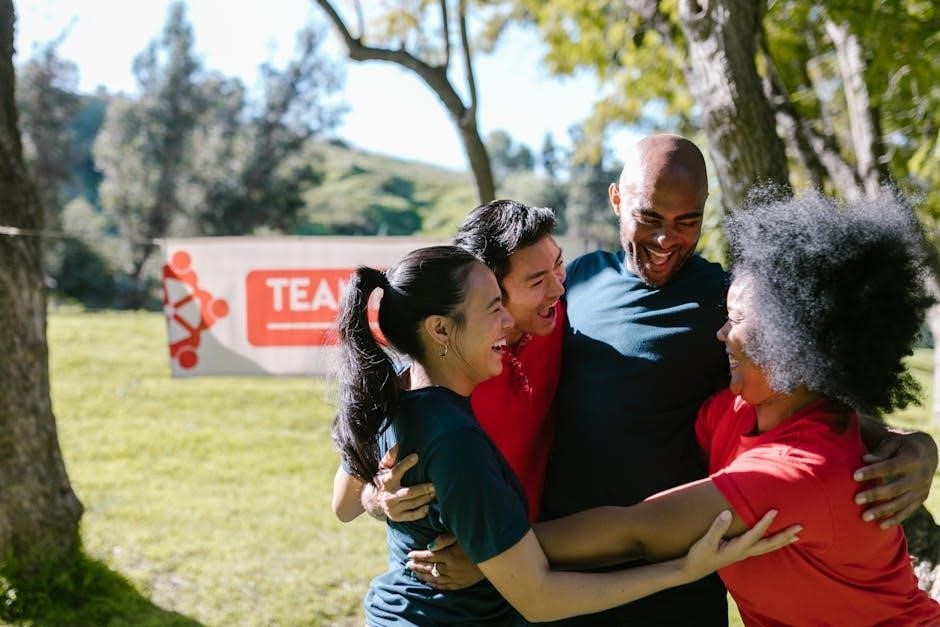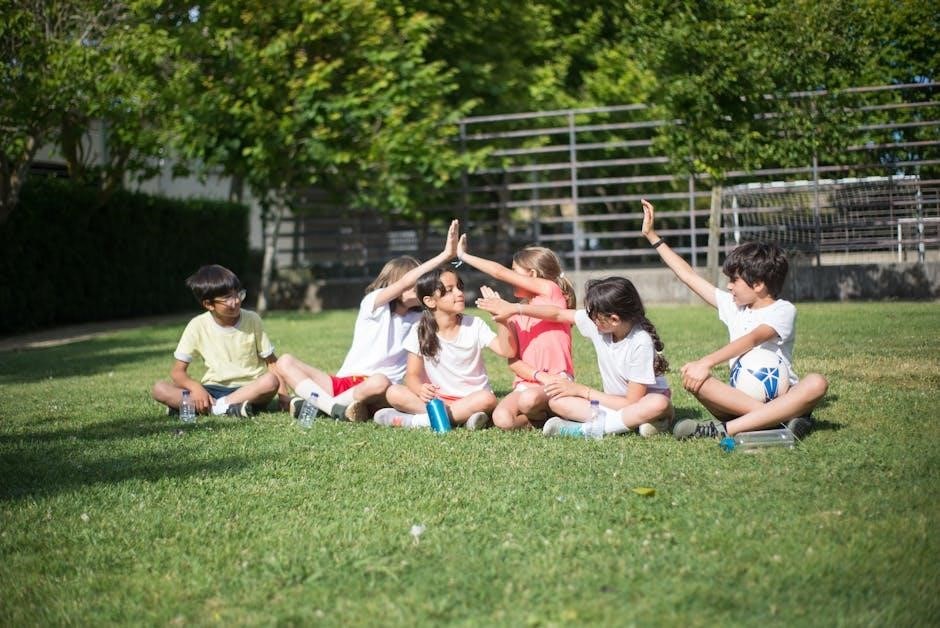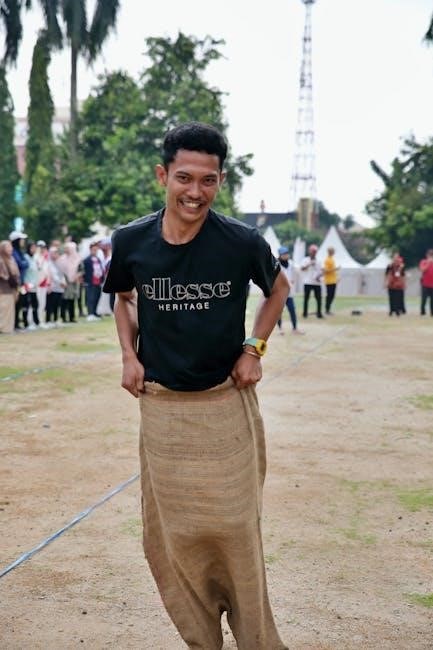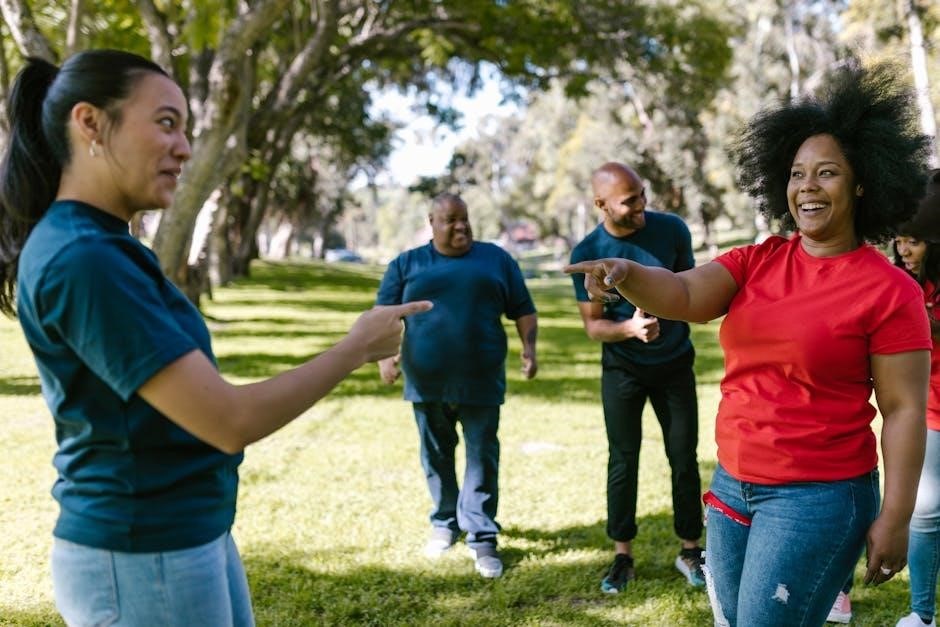Recovery games are interactive activities designed to support groups in addiction recovery, fostering engagement, teamwork, and emotional growth. They promote healthy communication and coping strategies, aiding participants in their journey toward sobriety and personal development.
1.1 What Are Recovery Games?
Recovery games are structured activities designed to facilitate emotional growth, teamwork, and healthy communication among individuals in group recovery settings. These games are often interactive and engaging, helping participants express emotions, develop coping strategies, and build trust. They can include icebreakers, problem-solving exercises, or creative tasks that encourage collaboration and reflection. Unlike traditional therapies, recovery games make the process more accessible and less intimidating, fostering a supportive environment. They are tailored to address specific challenges in addiction recovery, such as relapse prevention, boundary setting, and stress management. By focusing on shared experiences, recovery games help individuals connect on a deeper level, promoting a sense of community and mutual understanding. These activities are adaptable to various group dynamics and can be modified to suit different stages of recovery, making them a versatile tool in the journey toward sobriety and personal growth.
1.2 Why Are Recovery Games Important?
Recovery games are essential for fostering engagement and emotional growth in group recovery settings. They provide a safe space for participants to express themselves, develop coping strategies, and build trust. By encouraging teamwork and healthy communication, these activities help individuals address challenges such as relapse prevention and stress management. Recovery games are particularly important because they make the recovery process more accessible and less intimidating. They promote a sense of community and mutual understanding, which are crucial for long-term sobriety. Additionally, these games are adaptable to various group dynamics and can be modified to suit different stages of recovery. Overall, recovery games are a versatile and effective tool in supporting individuals as they work toward personal growth and sustained recovery. They offer a dynamic way to navigate the complexities of addiction recovery, making the journey more engaging and impactful.
1.3 Benefits of Group Recovery Games
Group recovery games offer numerous benefits, enhancing the overall recovery experience for participants. They foster teamwork, encouraging individuals to collaborate and support one another, which strengthens interpersonal connections. These activities also promote healthy communication, helping participants express emotions and challenges openly. By engaging in structured games, individuals can develop problem-solving skills and learn to navigate real-life situations more effectively. Group recovery games additionally provide a sense of accountability, as participants work together toward common goals. They create a distraction-free environment where individuals can focus on their recovery journey without external pressures. Furthermore, these games often incorporate elements of fun and creativity, making the recovery process more engaging and less intimidating. The collective energy of the group motivates participants to stay committed to their progress. Overall, group recovery games are a powerful tool for building resilience, fostering growth, and sustaining long-term recovery outcomes. They empower individuals to thrive both individually and as part of a supportive community.
1.4 Setting Boundaries and Expectations
Establishing clear boundaries and expectations is essential for the success of recovery games, ensuring a safe and structured environment for all participants. Boundaries help protect individuals from manipulations often associated with addiction, fostering accountability and mutual respect. Expectations guide behavior, outlining roles and responsibilities, which are vital for effective group dynamics. By setting these guidelines, participants can focus on their recovery without unnecessary distractions. Clear communication of boundaries and expectations also enhances trust, encouraging open dialogue and collaboration. These parameters ensure that recovery games remain focused on their primary goal: supporting individuals in their journey toward sobriety and personal growth. Without well-defined boundaries and expectations, the effectiveness of recovery games could be compromised, leading to potential conflicts or misunderstandings. Thus, they are foundational to creating a productive and supportive group recovery experience.

Types of Recovery Games
Recovery games include icebreakers, team-building activities, problem-solving exercises, and creative expression games. These diverse activities foster engagement, collaboration, and personal growth, tailored to support group recovery processes effectively.
2.1 Icebreaker Games for Group Recovery
Icebreaker games are essential for initiating group recovery sessions, helping participants feel comfortable and connected. These activities encourage open communication, reduce anxiety, and foster trust among members. Examples include “Two Truths and a Lie” or “Human Bingo,” which engage individuals in sharing personal experiences. By focusing on non-threatening topics, icebreakers create a safe space for individuals to express themselves. They also help facilitators assess group dynamics and identify potential challenges early on. The goal is to shift the focus from addiction to shared human experiences, promoting unity and collaboration. icebreaker games lay the foundation for more intensive group work, ensuring participants are mentally and emotionally prepared. These activities are particularly effective in diverse groups, addressing varying comfort levels and fostering an inclusive environment. Regular use of icebreakers can enhance the overall effectiveness of recovery programs by building strong interpersonal connections.
2.2 Team-Building Activities
Team-building activities are designed to strengthen relationships and collaboration within recovery groups. These exercises often involve problem-solving, shared goals, and mutual support, fostering a sense of unity and purpose. Examples include group puzzles, scavenger hunts, or collaborative storytelling. Such activities encourage active participation, helping individuals develop essential life skills like communication, trust, and conflict resolution. By working together, participants learn to rely on one another, breaking down isolation and stigma. Team-building also promotes accountability, as individuals contribute to collective success. These activities are particularly beneficial in recovery settings, where establishing strong support networks is crucial. They help participants build resilience and confidence, essential for overcoming addiction. Regular engagement in team-building exercises can enhance the overall recovery process, creating a sense of belonging and shared achievement. These activities are adaptable to various group sizes and dynamics, making them a versatile tool for facilitators.
2.3 Problem-Solving Exercises
Problem-solving exercises are interactive activities designed to help individuals in recovery develop critical thinking and decision-making skills. These exercises often involve scenarios or challenges that mimic real-life situations, requiring participants to collaborate and find solutions. For example, group puzzles or role-play activities can enhance cognitive function and encourage healthy communication. Such exercises are particularly beneficial for addressing relapse triggers and teaching coping strategies. By engaging in problem-solving games, participants learn to approach challenges systematically, building resilience and confidence. These activities also foster creativity and adaptability, essential for long-term recovery. Furthermore, problem-solving exercises promote accountability and teamwork, helping individuals understand the value of seeking support. Regular participation in these activities can improve overall mental health and readiness to handle life’s obstacles. They serve as a practical tool for facilitating personal growth and preparing individuals for independent living.

2.4 Creative Expression Games
Creative expression games are designed to help individuals in recovery explore and communicate their emotions through art, music, or storytelling. These activities provide an alternative to traditional talk-based therapies, allowing participants to express themselves non-verbally. Examples include art projects, group music sessions, or writing exercises where individuals share their experiences. Such games foster self-reflection and emotional release, which are crucial for healing. They also encourage participants to connect with others on a deeper level, reducing feelings of isolation. Creative expression games are particularly effective in helping individuals process trauma or difficult emotions related to their addiction. By engaging in these activities, participants can gain insights into their recovery journey and develop healthier ways to cope with stress and triggers. These games not only promote personal growth but also build confidence and a sense of accomplishment, which are vital for sustained recovery.

Implementing Recovery Games
Implementing recovery games involves assessing group needs, planning activities, and facilitating sessions. It requires setting clear objectives, ensuring participation, and adapting games based on feedback to create a supportive environment for growth and engagement.

3.1 Choosing the Right Games for Your Group
Selecting appropriate recovery games for your group is crucial for ensuring engagement and effectiveness. Start by assessing the group’s dynamics, interests, and recovery goals to tailor activities that resonate with their needs. Consider the group’s size, as some games work better with smaller or larger numbers. Ensure the games align with the recovery stage of participants, avoiding triggers or overly complex exercises for early-stage individuals. Incorporate activities that promote teamwork, problem-solving, and emotional expression, fostering a sense of community and trust. Be mindful of boundaries and ensure games are inclusive, respecting diverse backgrounds and experiences. Use person-first language and avoid stigmatizing terms to create a safe environment. Finally, adapt games based on feedback and group preferences, ensuring they remain relevant and impactful throughout the recovery journey. This thoughtful approach maximizes the benefits of recovery games for all participants.
3.2 Preparing Participants for Recovery Games
Preparing participants for recovery games is essential to ensure a positive and productive experience. Begin by setting clear expectations and explaining the purpose of the activities. Establish boundaries and ground rules to create a safe and respectful environment. Encourage participants to embrace the process with an open mind, emphasizing that the goal is growth and connection. Provide a brief overview of the types of games they will engage in, ensuring they understand the structure and objectives. Address any concerns or hesitations, fostering a sense of comfort and trust. Use person-first language and avoid stigmatizing terms to promote inclusivity. Offer reassurance that participation is voluntary and that their input is valued. Finally, introduce icebreaker activities to help participants relax and connect with one another, laying the foundation for meaningful engagement in recovery games. Proper preparation ensures participants are mentally and emotionally ready to benefit fully from the experience.
3;3 Facilitating Group Recovery Sessions
Facilitating group recovery sessions requires a balanced approach of structure and flexibility. The leader should create a safe, non-judgmental space where participants feel comfortable sharing and engaging. Begin by reviewing the session’s objectives and ground rules to ensure clarity; Active listening and empathy are crucial, as they help build trust and encourage open communication. Encourage participation by fostering an environment where everyone’s input is valued, regardless of their stage in recovery. Use techniques like role-playing or guided discussions to keep the group focused and engaged. Be prepared to address challenges, such as resistance or emotional triggers, with patience and understanding. Incorporate person-first language to avoid stigma and promote inclusivity. Provide constructive feedback and celebrate small victories to reinforce progress. By maintaining a supportive and structured approach, facilitators can help participants derive maximum benefit from recovery games, fostering growth and connection. This role is pivotal in guiding the group toward shared goals and healing.
3.4 Handling Challenges During Activities
Handling challenges during recovery games requires a combination of preparation and adaptability. Leaders should anticipate potential issues, such as resistance or emotional triggers, and have strategies to address them. Remaining calm and empathetic is essential to de-escalate tensions and maintain a safe environment. Encourage open communication, allowing participants to express their feelings while setting clear boundaries. If a activity becomes too intense, pause to reassess and adjust the approach. Incorporate person-first language to avoid stigma and promote inclusivity. Provide reassurance and remind participants of the session’s goals and ground rules. Redirecting the focus to the group’s collective well-being can help navigate difficult moments. By addressing challenges thoughtfully, leaders can turn potential setbacks into opportunities for growth and connection. This approach fosters resilience and strengthens the group’s ability to work through adversities together, ultimately enhancing the recovery process. Effective handling of challenges ensures the activities remain beneficial and engaging for all participants.

Tracking Progress and Outcomes
Tracking progress in recovery games involves monitoring participant engagement, emotional growth, and skill development. Regular feedback collection helps refine activities, ensuring they remain effective and relevant. Celebrating milestones fosters motivation and reinforces successes.
4.1 Monitoring Participant Progress
Monitoring participant progress in recovery games is essential to ensure the activities are effective and meet individual needs. This involves observing engagement levels, noting improvements in communication skills, and assessing problem-solving abilities. Feedback from participants and facilitators provides insights into emotional growth and behavioral changes. Regular check-ins help identify areas where participants may need additional support. By tracking progress, facilitators can adjust games to better align with the group’s evolving needs. This ongoing assessment ensures that recovery games remain a valuable tool in the journey toward sobriety and personal development. Consistent monitoring also allows for the celebration of small victories, enhancing motivation and reinforcing positive outcomes. Ultimately, this process supports a more tailored and impactful recovery experience for all participants.
4.2 Collecting Feedback from Participants
Collecting feedback from participants is a crucial step in evaluating the effectiveness of recovery games. This process helps understand what aspects of the games are beneficial and where improvements are needed. Feedback can be gathered through surveys, group discussions, or one-on-one interviews. Anonymous surveys often encourage honest responses, while group discussions allow for collaborative sharing of experiences. Participants may highlight specific games that resonated with them or suggest new activities they would find helpful. Facilitators should actively listen to this feedback and use it to refine future sessions. By involving participants in the evaluation process, they feel valued and empowered, which can enhance their engagement in recovery efforts. Regular feedback collection ensures that recovery games remain relevant and impactful, ultimately supporting the group’s progress toward their goals. This iterative approach fosters a dynamic and responsive recovery environment.
4.3 Adjusting Games Based on Feedback
Adjusting games based on participant feedback ensures that activities remain relevant and effective. This iterative process involves reviewing feedback to identify trends and areas for improvement. Facilitators may modify existing games or introduce new ones to better meet the group’s needs. For example, if participants find a particular exercise too challenging, it can be simplified or paired with additional support. Conversely, if a game is deemed too easy, it can be made more complex to encourage deeper engagement. Feedback may also reveal a need for more diversity in activities, prompting the inclusion of new games that cater to different learning styles or preferences. By making these adjustments, recovery games become more tailored to the group’s dynamics, enhancing their therapeutic impact. This adaptive approach not only improves participant satisfaction but also strengthens the overall recovery process, ensuring that the games remain a valuable tool for growth and healing.
4.4 Celebrating Successes in Recovery
Celebrating successes in recovery is a powerful way to reinforce positive progress and motivate participants. Recognizing milestones, whether small or significant, fosters a sense of accomplishment and pride. Group celebrations can include ceremonies, shared reflections, or creative expressions like art or music. These moments not only honor individual achievements but also strengthen the bond within the group, creating a supportive and encouraging environment. Facilitators can use these opportunities to highlight how far participants have come, reinforcing the effectiveness of recovery games. Successes can also be shared with families or caregivers, further amplifying their impact. By celebrating progress, participants are reminded of their capabilities and the value of their efforts, which can inspire continued commitment to their recovery journey. This positive reinforcement is essential for building resilience and maintaining motivation, ensuring that the recovery process remains meaningful and impactful for all involved.

Case Studies and Examples
Case studies highlight the effectiveness of recovery games in group settings, offering real-life examples of successful outcomes and practical insights for facilitators and participants alike.
5.1 Successful Group Recovery Game Examples

Successful group recovery games often involve interactive and engaging activities that promote teamwork, trust, and emotional expression. For instance, role-playing exercises have been widely used to help participants practice healthy communication skills and boundary-setting. Another example is the “Guess the Sticker” game, where participants guess which stickers a child or young person might choose, fostering empathy and understanding. These games are designed to create a safe environment for individuals to share their experiences and learn from one another. Case studies, such as the qualitative study by AJ King in 2022, highlight the positive outcomes of group activities cofacilitated by peer workers and clinicians, showing improved engagement and personal growth among participants. Such examples demonstrate the power of recovery games in building resilience and fostering meaningful connections within groups.
5.2 Lessons Learned from Group Activities
Group recovery activities have taught valuable lessons about fostering engagement and promoting personal growth. One key takeaway is the importance of creating a safe and non-judgmental environment, where participants feel comfortable sharing their experiences. Activities like role-playing exercises have shown that practicing healthy communication and boundary-setting can significantly improve interpersonal skills. Additionally, incorporating creative elements, such as art or music, has proven effective in helping individuals express emotions that are difficult to articulate. However, challenges like initial resistance to participation or skepticism about the effectiveness of games have been observed. Addressing these issues requires facilitators to be flexible and adaptable, ensuring activities align with the group’s needs and preferences. Overall, these lessons highlight the importance of tailoring approaches to maximize engagement and emotional connection, ultimately enhancing the recovery process for all participants. These insights are invaluable for designing impactful group recovery programs.
5.3 Overcoming Common Challenges
Group recovery activities often face challenges such as participant resistance, uneven engagement, or difficulty in opening up about personal struggles. One common issue is skepticism about the effectiveness of games in addressing serious issues like addiction. To overcome this, facilitators must clearly explain the purpose and benefits of each activity, ensuring participants understand how it relates to their recovery. Another challenge is managing diverse group dynamics, where some individuals may dominate conversations while others remain silent. Strategies like active listening exercises, role-playing, and encouraging peer support can help balance participation. Additionally, setting clear boundaries and expectations upfront can minimize conflicts and ensure a productive environment. Facilitators should also be prepared to adapt activities based on feedback, ensuring they meet the group’s evolving needs; By addressing these challenges proactively, group recovery games can become a powerful tool for fostering connection and growth.

5.4 Real-Life Applications of Recovery Games
Recovery games are widely used in therapeutic settings, support groups, and community programs to aid individuals in their journey toward sobriety and emotional well-being. These activities are often incorporated into treatment plans for substance abuse, mental health recovery, and behavioral rehabilitation. For instance, icebreaker games help participants build trust and rapport, while problem-solving exercises enhance critical thinking and teamwork. Creative expression games, such as art or writing activities, provide outlets for processing emotions and sharing experiences. In real-life scenarios, these games have been successfully implemented in group therapy sessions, halfway houses, and school counseling programs. They are particularly effective in engaging individuals who may struggle with traditional talk therapy. By making recovery engaging and interactive, these games foster a sense of community and accountability, which are crucial for long-term success. Their versatility allows them to be adapted to various settings, cultures, and age groups, making them a valuable tool in the recovery process. Facilitators often report positive outcomes, including improved communication and increased participation from group members.
Moving forward, recovery games are powerful tools in therapy and support groups, fostering trust and problem-solving skills. Their continued use and exploration are crucial for advancing group recovery efforts effectively.
6.1 The Future of Recovery Games
The future of recovery games lies in their integration with modern technology and diverse therapeutic approaches. By combining digital tools with evidence-based methodologies, these games can reach a broader audience, enhancing accessibility and engagement. Incorporating real-time feedback mechanisms will allow facilitators to tailor activities to specific group needs, ensuring maximum effectiveness. Additionally, the development of culturally sensitive games will cater to diverse populations, making recovery more inclusive. As research evolves, the role of recovery games in mental health and addiction treatment is expected to expand, offering innovative solutions for sustainable recovery. This evolution will likely involve collaborations between therapists, designers, and participants to create dynamic and impactful experiences. The potential for growth is immense, promising a brighter, more supportive future for recovery efforts worldwide.
6.2 Encouraging Continued Participation

Encouraging continued participation in recovery games is crucial for sustained progress and long-term success. Positive reinforcement and recognition of efforts can motivate individuals to stay engaged. Creating a supportive environment where participants feel valued and heard fosters commitment. Providing feedback and celebrating small achievements helps build confidence and maintains interest. Involving participants in the planning process, allowing them to contribute ideas for activities, can also increase their investment in the program. Consistency in scheduling and clear communication of the benefits of ongoing involvement are key. Additionally, offering flexibility to adapt games to meet the evolving needs of the group ensures that the activities remain relevant and engaging. By addressing any challenges promptly and incorporating participant feedback, facilitators can create a dynamic and inclusive space that encourages ongoing participation and supports lasting recovery outcomes. This approach not only enhances engagement but also strengthens the sense of community within the group.
6.3 Resources for Further Learning
For those interested in exploring recovery games further, numerous resources are available to deepen understanding and enhance facilitation skills. Training manuals, such as the “Straight Ahead” guide by NG Bartholomew, provide detailed strategies for substance abuse counselors. Workbooks focusing on DBT skills, like the one by T Marra, offer practical exercises that can be adapted for group recovery activities. Online courses and webinars on platforms like Coursera or Udemy cover topics such as group facilitation and addiction recovery techniques. Additionally, organizations like the Mental Health Coordinating Council offer recovery-oriented language guides to ensure compassionate communication. Research studies, such as the one by AJ King on peer-led groups, provide insights into effective group dynamics. These resources empower facilitators to create engaging and impactful recovery games, ensuring participants receive the support they need for lasting recovery.
6.4 Final Thoughts on Group Recovery
Group recovery games are a powerful tool for fostering connection, growth, and resilience among participants. By incorporating interactive activities and team-building exercises, these games create a supportive environment where individuals can share experiences and learn from one another. The emphasis on healthy communication and problem-solving not only aids in addiction recovery but also equips participants with skills for long-term success. Facilitators play a crucial role in guiding these sessions, ensuring they are both engaging and meaningful. As participants progress, celebrating their achievements reinforces the positive impact of group recovery. The combination of fun, reflection, and community makes recovery games an invaluable component of the healing journey. By fostering a sense of belonging and purpose, these games help individuals build a stronger foundation for sustained recovery and personal growth.

